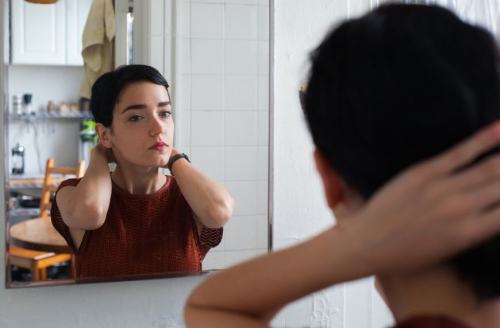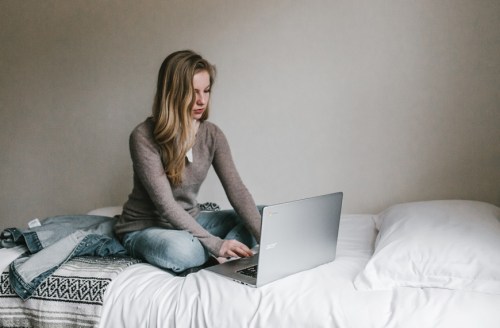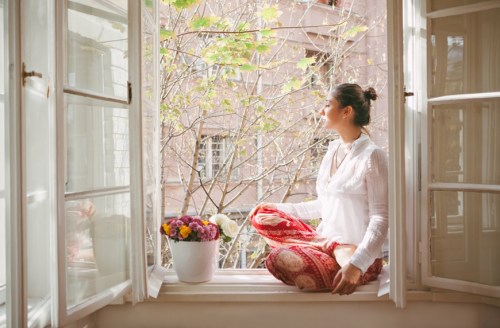I want to be a wellness warrior, but my anxiety disorder is getting in the way
Working out and healthy eating are great for your mental health—except when they trigger OCD and generalized anxiety disorder. Here's how one writer navigates the fine line between wellness and obsession.

I love to work out. CrossFit, SoulCycle, boxing, hot yoga, the Megaformer—you name it, I’m into it.
But recently, I’ve started doing some combination of two or three of those classes… in a single day. On days when I “only” make it to one workout, I get down on myself. (Like going to the gym once a day isn’t already a great accomplishment.) Extreme stress and questions fill my head: Am I pushing myself hard enough? Am I going to backslide on my weight-loss progress? Will I ever get stronger?
On those days, I’m not working out because I love it. My desires are not coming from a healthy place.
This is a frighteningly familiar pattern for me. Years ago, before I was diagnosed with generalized anxiety disorder and OCD and subsequently began taking medication, I would spend hours at the gym. I was also heavily regulating my caloric intake. I became obsessed. And it’s starting to happen again.
Wellness is different when you have anxiety and obsessive tendencies. People talk about fitness and food in relation to how they can improve your mental wellbeing—but what happens when, instead, they bring out some of the worst parts of your mental illness? That’s what I’m facing.
Keep reading for more on the complex relationship between wellness and anxiety.

When you try to create change—but it doesn’t come easy
I’d like to say that once I recognized my OCD and anxiety were manifesting themselves in the form of obsessive exercise, I was able to scale back on the workouts. But it doesn’t work like that. It’s weird to know you’re doing something that’s not beneficial to your health, but you can’t stop. Sometimes my mental illness shows up with me sitting at my computer, rereading an email again and again, near tears but physically incapable of hitting send. Other times, it’s about over-exercising and meticulously restricting the food I eat.
It’s tricky to navigate wellness when you have anxiety, because sometimes you can get away with self-destructive behaviors in the name of health.
It’s like buying a $30 loaf of banana bread at Erewhon, one of LA’s trendiest (and priciest) health food stores. On an intellectual level, I understand how not-okay that is. But emotionally, I find myself swept up in the promise of the best banana bread ever.
It’s tricky to navigate wellness when you have anxiety, because sometimes you can get away with self-destructive behaviors in the name of health. The solution isn’t to stop exercising and eating healthy, because that can also bring out my obsessive tendencies. It’s about finding balance—a quest that feels almost Sisyphean.

Inadequacy, Instagram, and me
Also, it’s impossible to talk about wellness without talking about Instagram. These days, the two are inextricably entwined—just look at the more than 17 million posts with the hashtag #wellness. You want to see inspiring before and after weight-loss photos? A search for #weightlosstransformation yields nearly four million results.
Barbara Nosal, PhD and Chief Clinical Officer at the Newport Academy rehab center, tells me we all have a tendency to monitor and compare ourselves to others, especially in regards to diet and exercise. And Instagram exacerbates this. “It increases stress and discomfort and can impact self-esteem,” she says.
As a wellness writer who lives in Los Angeles, I’ve become somewhat brainwashed to think I can cure all my problems with a trip to a tonic bar and some crystals. Yet, that’s not true—I still need medication.
I’ve found that there’s definitely a feeling of inadequacy that comes with scrolling through my feed—and it’s not just about aesthetics. If so-and-so influencer can cure their anxiety with CBD oil, why can’t I? I diligently dose myself with it. I put maca in my morning protein shakes. I’ve done my research on adaptogens. And yet all of this isn’t enough to keep my anxiety in check. Am I somehow less, how shall I say this, well?
As a wellness writer who lives in Los Angeles, I’ve become somewhat brainwashed to think I can cure all my problems with a trip to a tonic bar and some crystals. Yet, that’s not true—I still need medication. Once, when I stopped taking it, my stress levels were so high I suffered adrenal fatigue.

Where medicine and wellness meet
While taking medication to treat mental health has become more acceptable in our culture, I’ve found that doesn’t mean there isn’t still a stigma attached to it. I mean, just read this article in The New York Times. Even the headline—”Many People Taking Antidepressants Discover They Cannot Quit”—makes me feel that there’s something wrong with taking medication for my mental health. Quitting implies that you’re doing something bad. There’s still a tendency to not treat mental health as seriously as physical health.
But there can be a happy medium between traditional Western medicine and a holistic approach to mental health. For instance, Nosal recommends that I add meditation and yoga to my routine. “These activities bring us into our body so that we can relax,” she says. “They help with emotional regulation and keep us centered.” This is especially important for people who have anxiety and OCD, she tells me. Working out (but not overtraining) and eating a balanced diet (but not restricting myself) have also been invaluable tools for managing my anxiety.
I’ve had to learn not only to recognize when my anxiety is manifesting in my fitness routine, but also to have tools in place to put a stop to it.
Some days I wish I could treat my symptoms without drugs, but that’s not me right now, and I have to accept it. “As the person taking the medication, you have to be okay with saying ‘This is what I need today,'” Nosal says. And maybe in the future I won’t need it. Or maybe I will. Either way, it’s okay. I’m finally coming to terms with that.
It took months for me to realize that my obsession with the gym wasn’t healthy. Then it took a couple of years to form a positive, healthy relationship with food and working out. This time, it’s only taken me a few days to realize something was wrong, and I’m taking steps to correct it. I’ve had to learn not only to recognize when my anxiety is manifesting in my fitness routine, but also to have tools in place to put a stop to it.
Managing the relationship between my anxiety and wellness isn’t easy, but I’m getting the hang of it. And that really puts things in perspective.
Next up, read more about the cultural movement toward mental health transparency—and the role that Kate Middleton and Meghan Markle are playing in the conversation.
Sign Up for Our Daily Newsletter
Get all the latest in wellness, trends, food, fitness, beauty, and more delivered right to your inbox.
Got it, you've been added to our email list.










